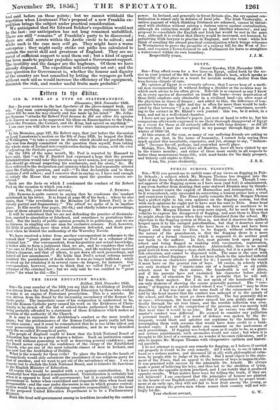THE IRISH EDUCATION BOARD.
Belfast, 25th November 1856. Em—In your number of the 16th you say that the Archbishop of Dublin was driven from the Irish Board of National Education by those who wished to make it an engine of Protestant proselytism. This is a mistake. He was driven from the Board by the increasing ascendancy of the Roman Ca- tholic party. The immediate cause of his resignation is understood to be, that the Roman Catholic party caused his work on the Evidences of Chris- tianity to be struck off the list of school-books authorized by the Board; being probably offended by a statement of those Evidences which makes no mention of the authority of the Church. It is easy to represent the Archbishop's conduct as the mere result of Pique_ ; but the predominance of the Roman Catholic party really left him no other course ; and it must be remembered that he is one of the oldest and most persevering friends of national education, and in no way identified with the so-called Evangelical party. The people of England ought to know that the Irish National Board of Education has been in a great degree a failure. Such an institution cannot work well without possessing as well as deserving general confidence ; and the Board never enjoyed the confidence of the clergy of the Established Church, who are one of the most valuable classes of men in Ireland, and has now lost the Archbishop of Dublin.
What is the remedy for these evils ? To place the Board in the hands of Evangelicals would only substitute the ascendancy of one religious party for that of another, and we want to get rid of the ascendancy of any. I see no remedy but to abolish the Irish National Board, and to transfer its functions to the .English Minister of Education.
Of course this Would be assailed with a cry against centralization. It is wonderful how this subject is misunderstood. Centralization is certainly bad when it is opposed to local self-government; but it is equally certain that government is better when centralized and responsible than when local and Irresponsible : and the ease under discussion is one in which greater central- ization would be a means of obtaining complete responsibility ; for the head of the proposed United Education Department is to be a Parliamentary Minister.
Bona fide local self-government among us is seldom invaded by the central power. In Ireland, and generally in Great Britain also, the cry against cen- tralization is raised only in defence of local jobs. The Irish Viceroyalty, a useless pageant of which thinking Irishmen are ashamed, cannot be threat- ened with abolition without raising a furious outcry against centralization, although its extinction would affect no local liberties whatever ; and any proposal to consolidate the English and Irish bar would be met in the same way, although it is evident that liberty would be increased, not lessened, by permitting Irish lawyers to practise in England, and vice versa: while few think of assailing the absurd practical centralization which brings witnesses to Westminster to prove the preamble of a railway bill for the West of Ire- land, and requires a Town-Council to ask Parliament for leave to straighten a watercourse within its own boundary.


























 Previous page
Previous page